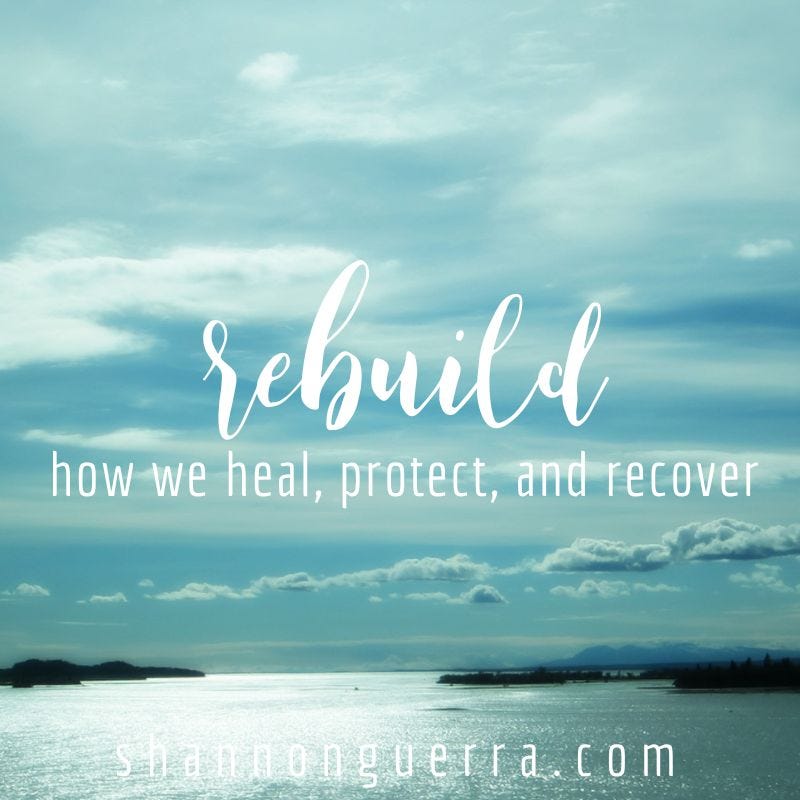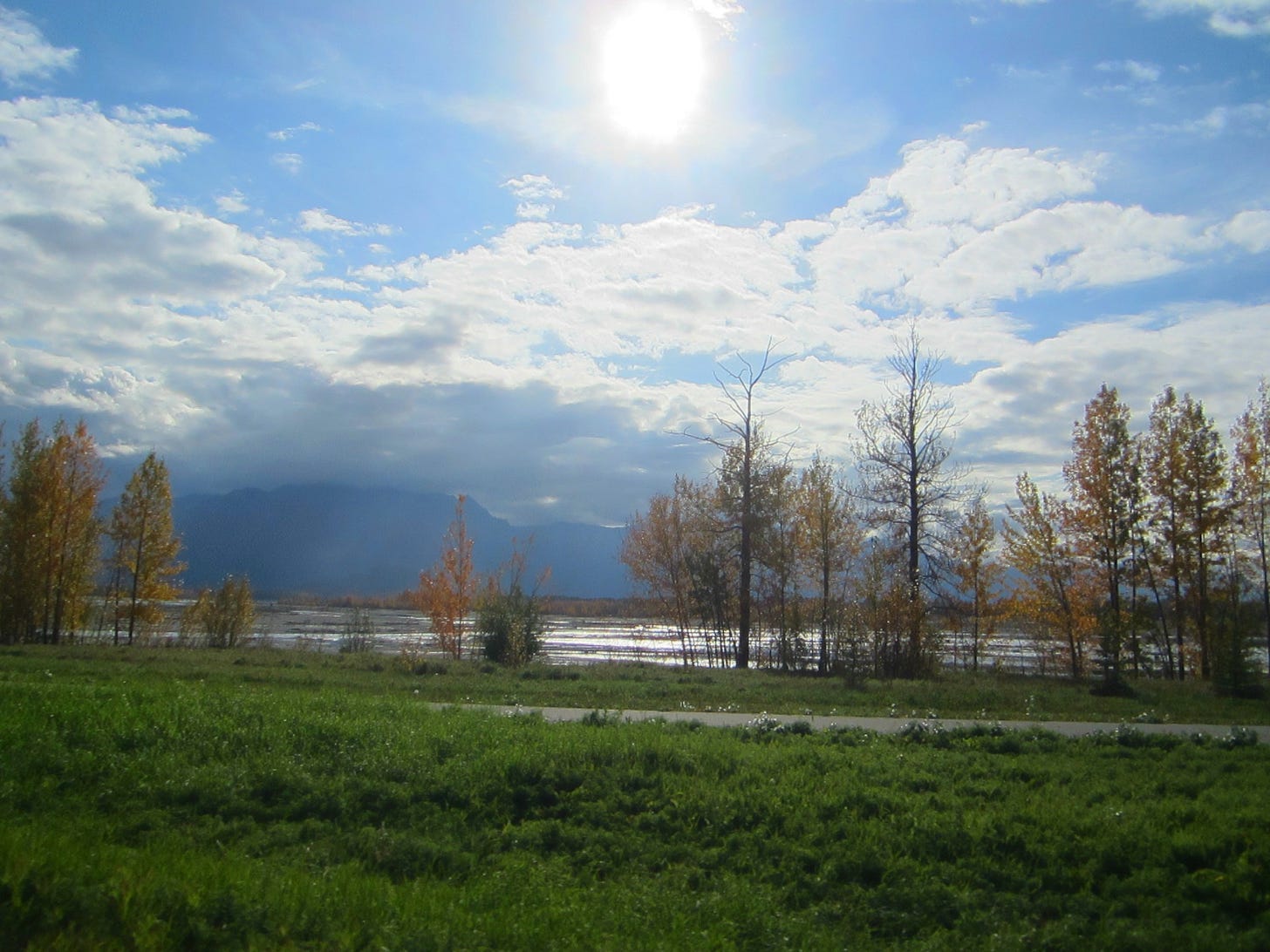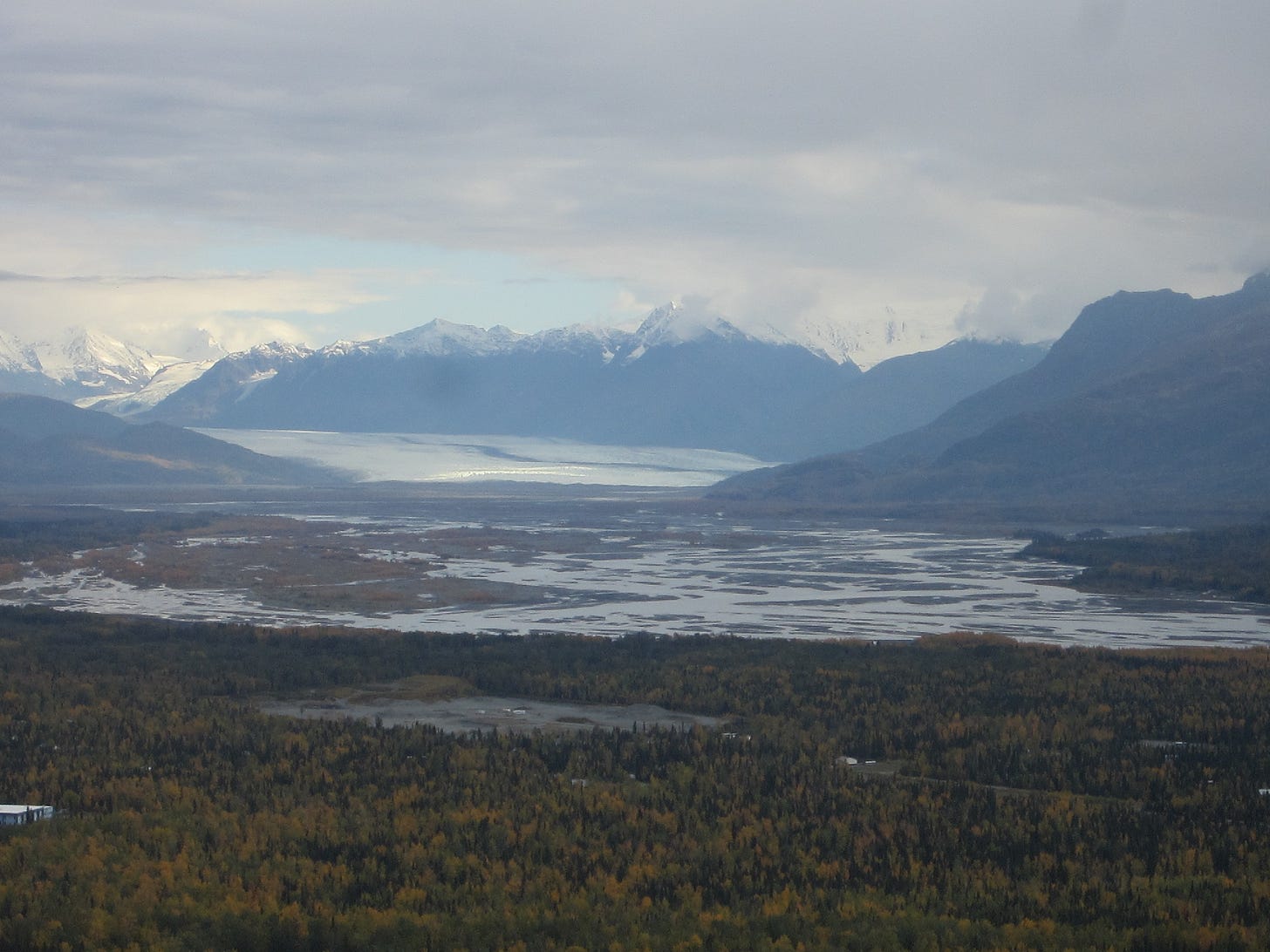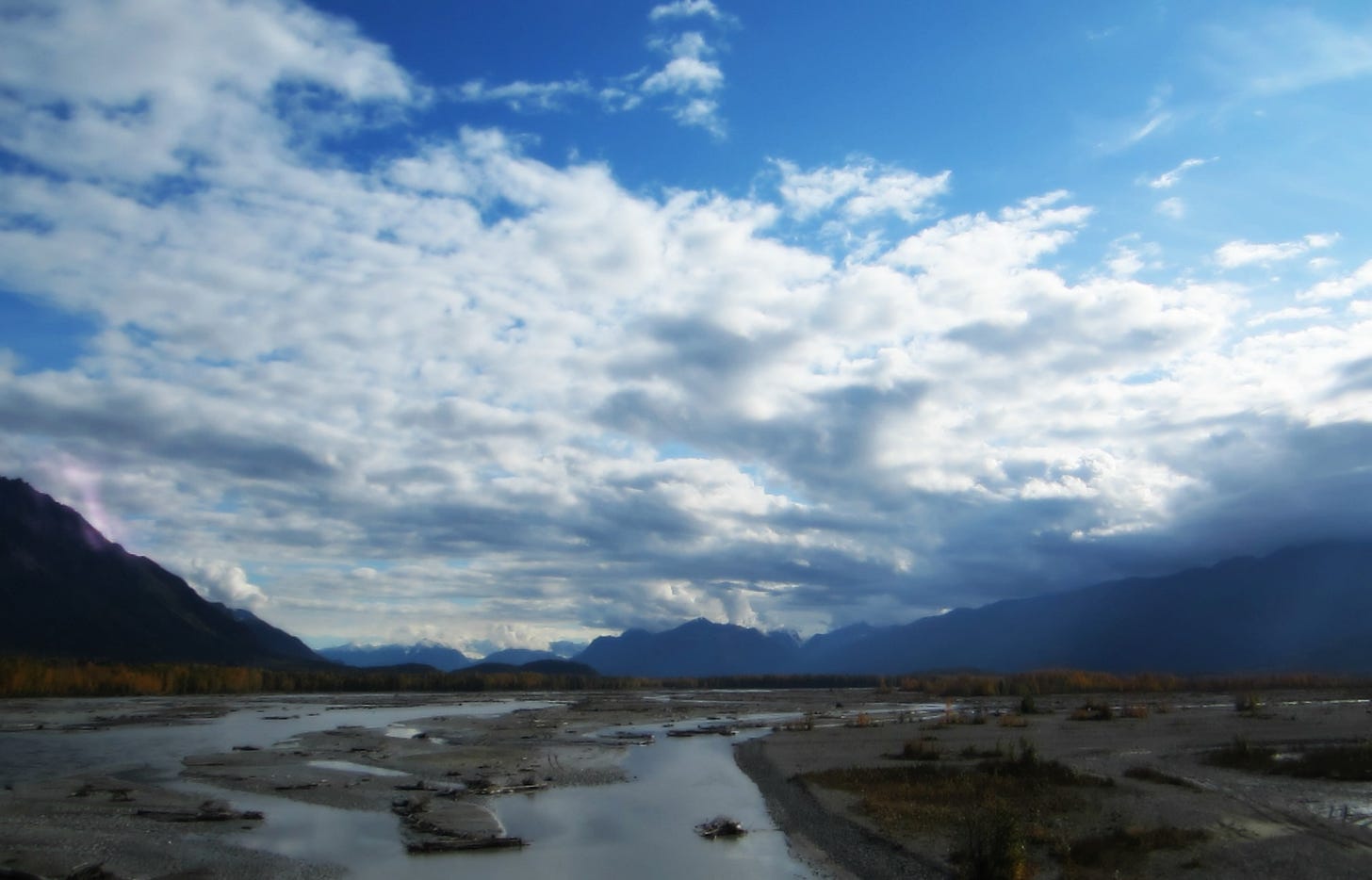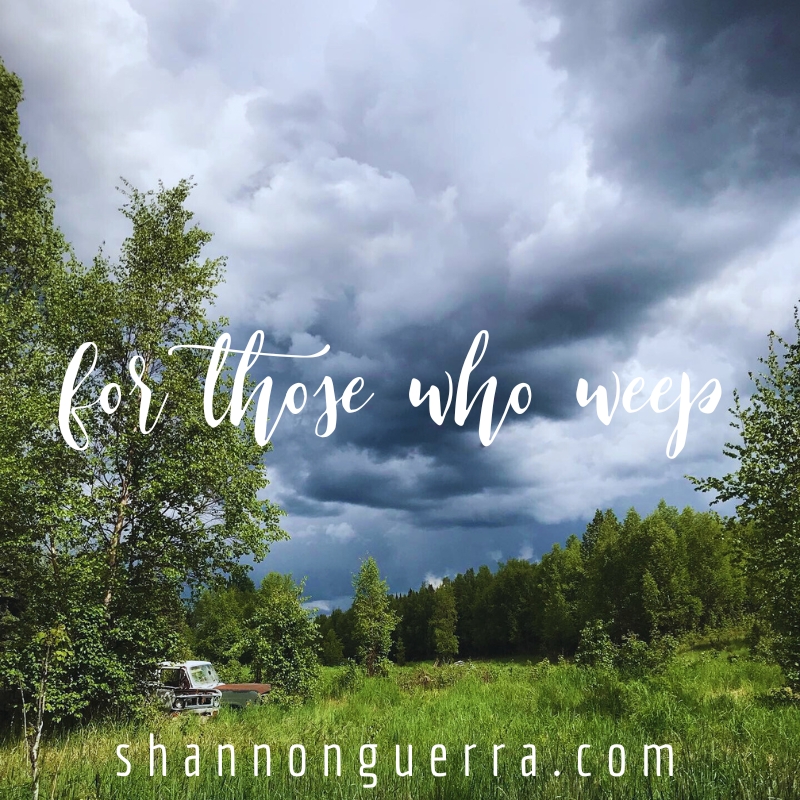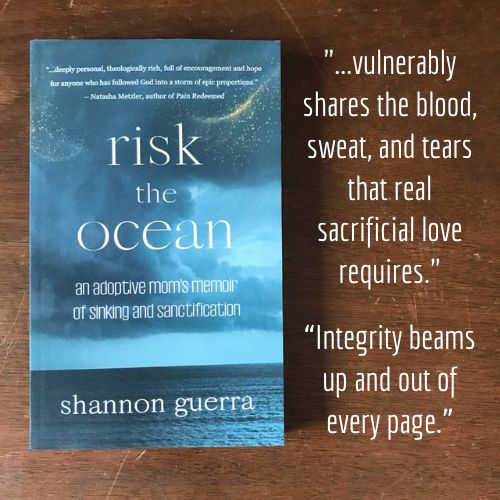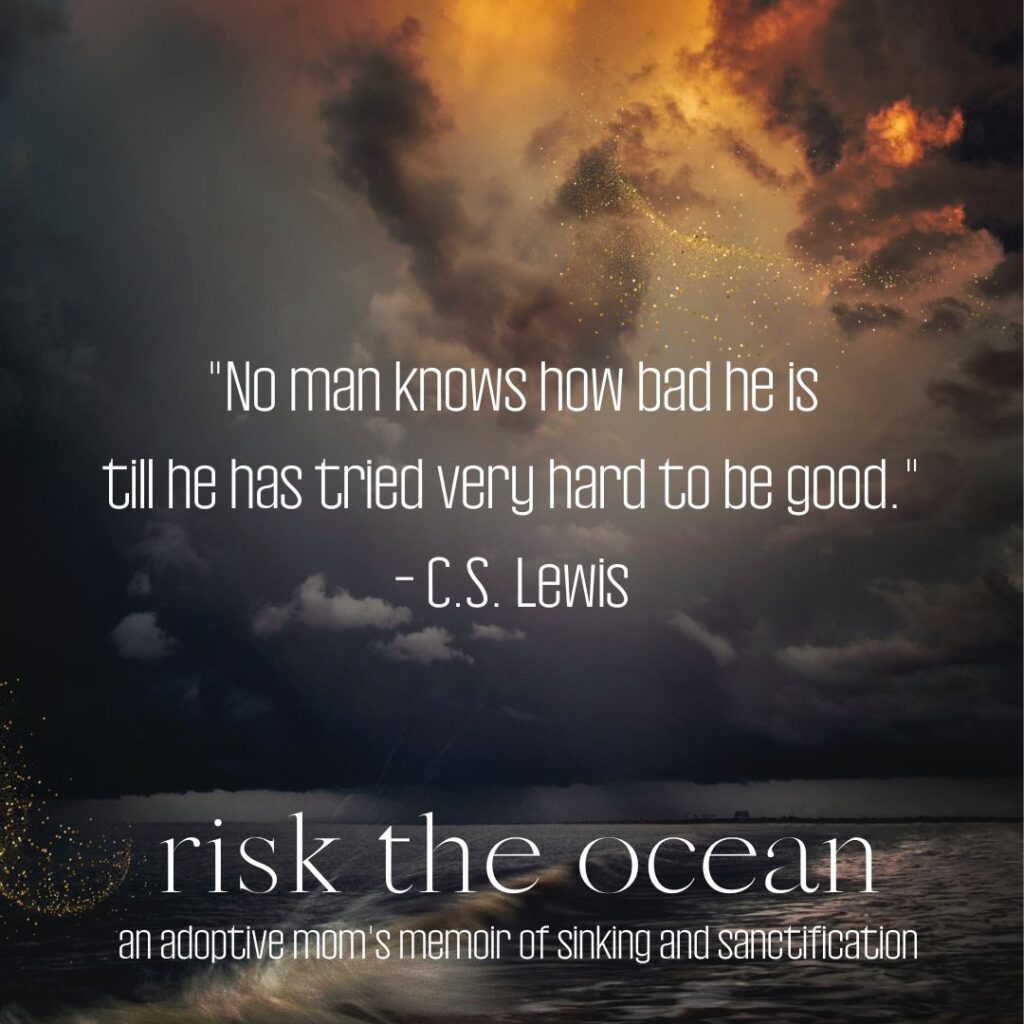While the boys tangled the tree in ribbon and bedecked it with shiny balls that would hopefully not shatter overnight from the cats’ meddling, I tucked my coffee behind the nativity set and rearranged Wodehouse books in the library.
“Do you know how many Wodehouse books we have?” I asked Vince, and he shook his head. Except for the passages I have read aloud to him while laughing so hard I gasped for air, he has never read Wodehouse.

“This stack here…” I pointed to a wobbly column over two feet high, and he began to laugh but stopped short when I continued, “and this stack here,” pointing to another stack behind the first one, which wasn’t as tall but probably kept the first column from collapsing, like a literary version of a flying buttress.
“How many books did Wodehouse write?” he asked – envy, inspiration, and disbelief, all in one question.
“Seventy or eighty, I think…not counting his plays and stuff. We only have about half of them.”
(Only, she said, and then wasted thirty minutes searching the internet for the exact number – it’s 71, if you’re only counting novels – and then another ten minutes adding his three autobiographies to her wishlist.)
I’ve spent money on bad books before but I’m more careful now; I didn’t start collecting Wodehouse books until I knew they were worth it. Now, though, I have tasted and seen – or, laughed and choked on my coffee – and I know they are good.
“There are moments, Jeeves, when one asks oneself, ‘Do trousers matter?'”
“The mood will pass, sir.”
– P.G. Wodehouse, The Code of the Woosters
A few days later, the other part of our book order arrived. I cut the shipping bag open with kitchen scissors and pulled out the used paperbacks.
“More Wodehouse!” I grinned.
“More Wodehouse,” Vin repeated, with far less enthusiasm. “Like, more cowbell.“
“Hey. If you read Wodehouse, you’d be excited too,” I told him.
She laughed — a bit louder than I could have wished in my frail state of health, but then she is always a woman who tends to bring plaster falling from the ceiling when amused.
― P.G. Wodehouse, The Code of the Woosters
But he hasn’t tasted and seen yet. He’s only heard and marveled, off and on, as I’ve barely muffled hysterical laughter way too late at night, trying not to wake up the kids.
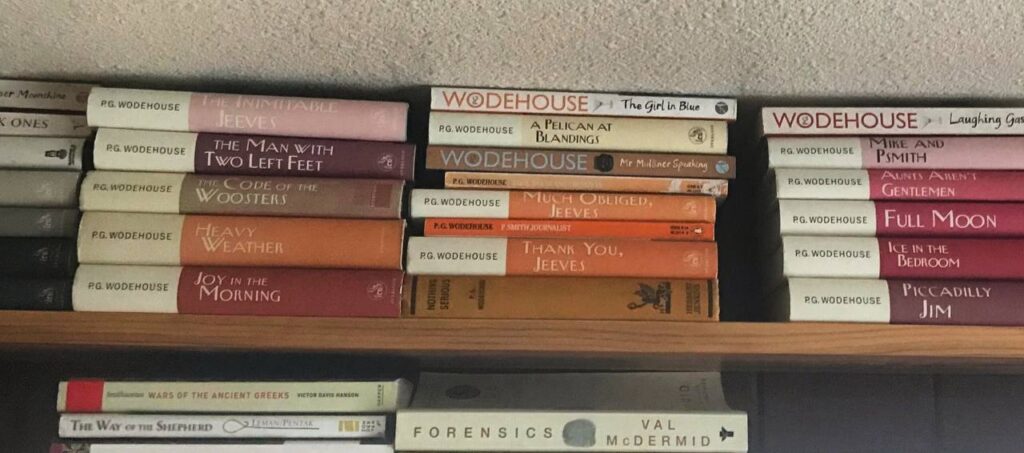
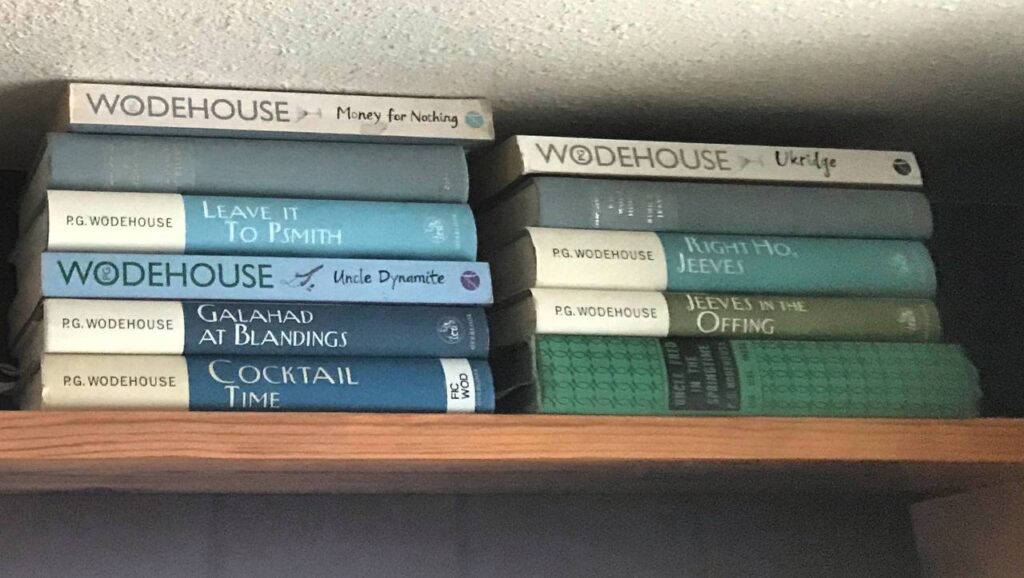
Oh, taste and see that the Lord is good!
Blessed is the man who takes refuge in him!
Oh, fear the Lord, you his saints,
for those who fear him have no lack!– Psalm 34:8-9
Vin is, however, grateful he married a thrifty woman who hates shopping, whose main addictions are classic lit and wool yarn, both of which can be found in practically new condition at secondhand stores. And they both give a good return, if stewarded well and not just hoarded.
“For it will be like a man going on a journey, who called his servants and entrusted to them his property. To one he gave five talents, to another two, to another one, to each according to his ability. Then he went away.
– Matthew 25:14-15
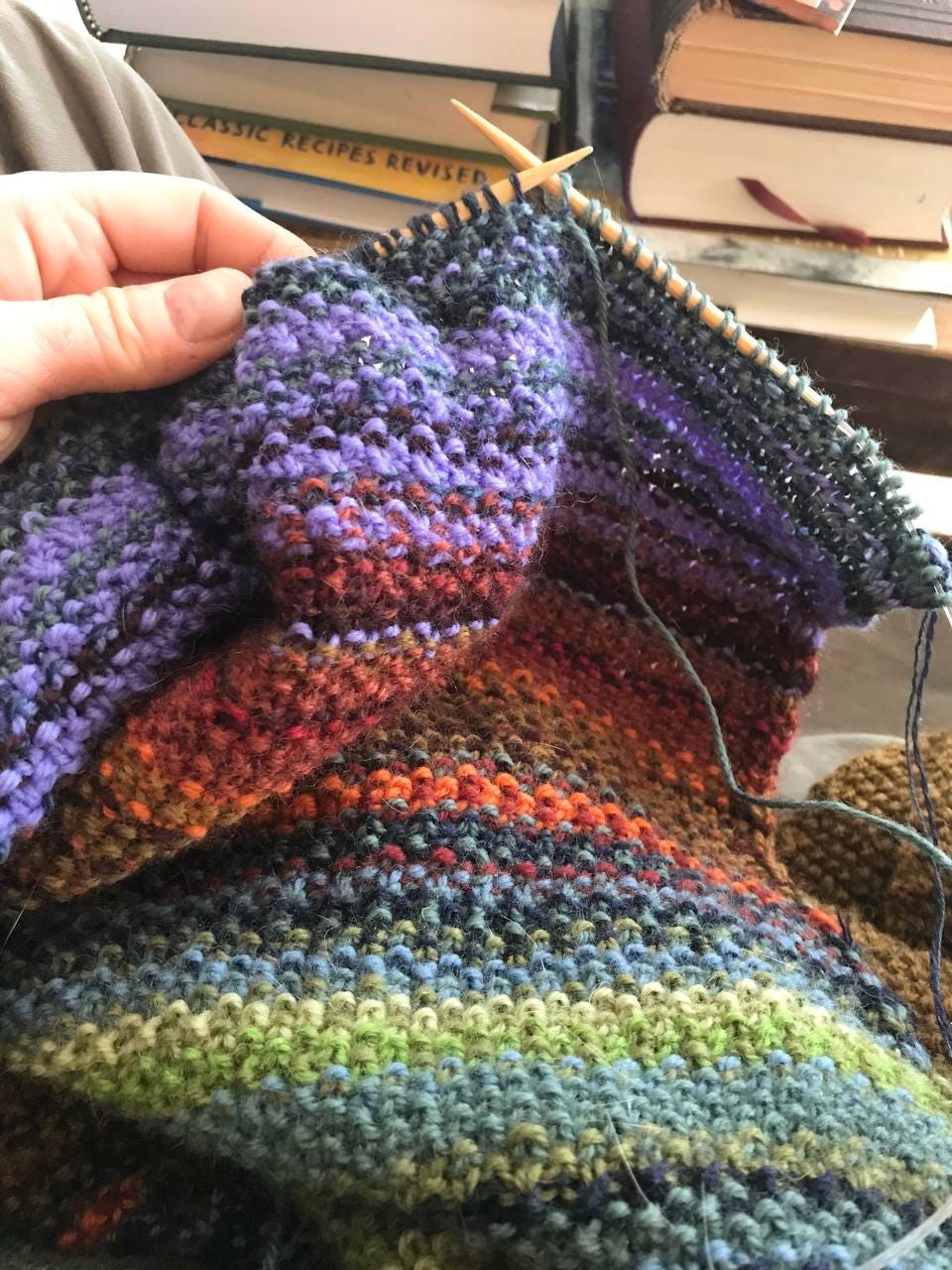
So we segue to the parable of the talents, a story of a king who entrusts his servants with varying amounts of wealth to steward for him. And you know what happens: The master returns, and the ones who had five and two doubled their talents and were rewarded, but the one who had only one talent…well, let’s see what it says:
He also who had received the one talent came forward, saying, “Master, I knew you to be a hard man, reaping where you did not sow, and gathering where you scattered no seed, so I was afraid, and I went and hid your talent in the ground. Here, you have what is yours.”
– Matthew 25:24-25
Huh. He knew, so he was afraid, so he hid. Where have we heard that before?
Oh, right. Here, in the very beginning:
The Lord God took the man and put him in the garden of Eden to work it and keep it. And the Lord God commanded the man, saying, “You may surely eat of every tree of the garden, but of the tree of the knowledge of good and evil you shall not eat, for in the day that you eat of it you shall surely die.”
– Genesis 2:15-17
In the beginning there was a certain amount of knowing that we weren’t supposed to have, because it would usurp our trust of God and make us focus on the wrong things. We began with a holy fear of God, which is trust and surrender. But in knowing the wrong things, we moved into an unholy fear that chose to walk in anxiety and control, which is just us saying, I know better than You do.
But the serpent said to the woman, “You will not surely die. For God knows that when you eat of it your eyes will be opened, and you will be like God, knowing good and evil.”
So the woman takes and eats the fruit, and she also gives some to her husband who was with her (side note: We can stop blaming the fall entirely on women, thanks), and he eats it, too.
They realize they’re…you know, nekkid. Fig leaves, loincloths, strategically placed locks of hair.
We pick up in verse 8:
And they heard the sound of the Lord God walking in the garden in the cool of the day, and the man and his wife hid themselves from the presence of the Lord God among the trees of the garden.
But the Lord God called to the man and said to him, “Where are you?”
And he said, “I heard the sound of you in the garden, and I was afraid, because I was naked, and I hid myself.”
– Genesis 3:8-10
Maybe it’s because when they did it their own way, they did it backwards. They didn’t taste and see; they saw and tasted – and then they knew something they were never intended to. They traded intimacy for exposure. They forfeited holy fear and got terror, shame, and separation instead.
We do this when we get things backwards, too. Recently I had a meeting coming up and I realized I was rehearsing information, asking myself possible questions and answers. I wondered if I was being too vulnerable, if I could trust this other person, if they would misunderstand my intentions.
Why am I nervous? I finally asked myself. Because I want this, and I don’t want to blow it.
Also, I felt exposed – like maybe I’d stepped forward where I should’ve held back; should’ve kept that talent under wraps where it would be safe, and do nothing.
Master, you gave me one book and I stuffed it under my mattress and did not read it, did not wrinkle the pages, did not bend the spine or dog-ear the corners, didn’t even take any notes. I did not get anything out of it, but also, look! It’s in pristine condition, so you won’t be mad at me for damaging it. Here you go. Thanks so much for the loan.
It’s the wrong kind of fear. That kind is the fear of man, and it’s all about impressing others, worrying about what someone else will think.
Surrender and honesty disarms it, though. So I asked myself these questions:
Do I want what I want, or do I want what He wants? Can I trust Him to know what I want better than I do, and know how to arrange it better than I could? Can I trust Him with the future, with relationships, with this conversation?
Do I trust Him to direct the situation and the timing? Do I trust Him to go ahead of me, and to give me the right words and wisdom?
Yes, yes, all yes. I have tasted and seen and I know He is good.
So suddenly the pressure is off, and there’s just joy and freedom. Just pleasant conversation and curiosity of what God does through it. The vulnerability doesn’t feel like exposure; it feels like faith that’s spelled risk, and it brings a return.
This is the talent surrendered that grows and multiplies, rather than runs and hides.
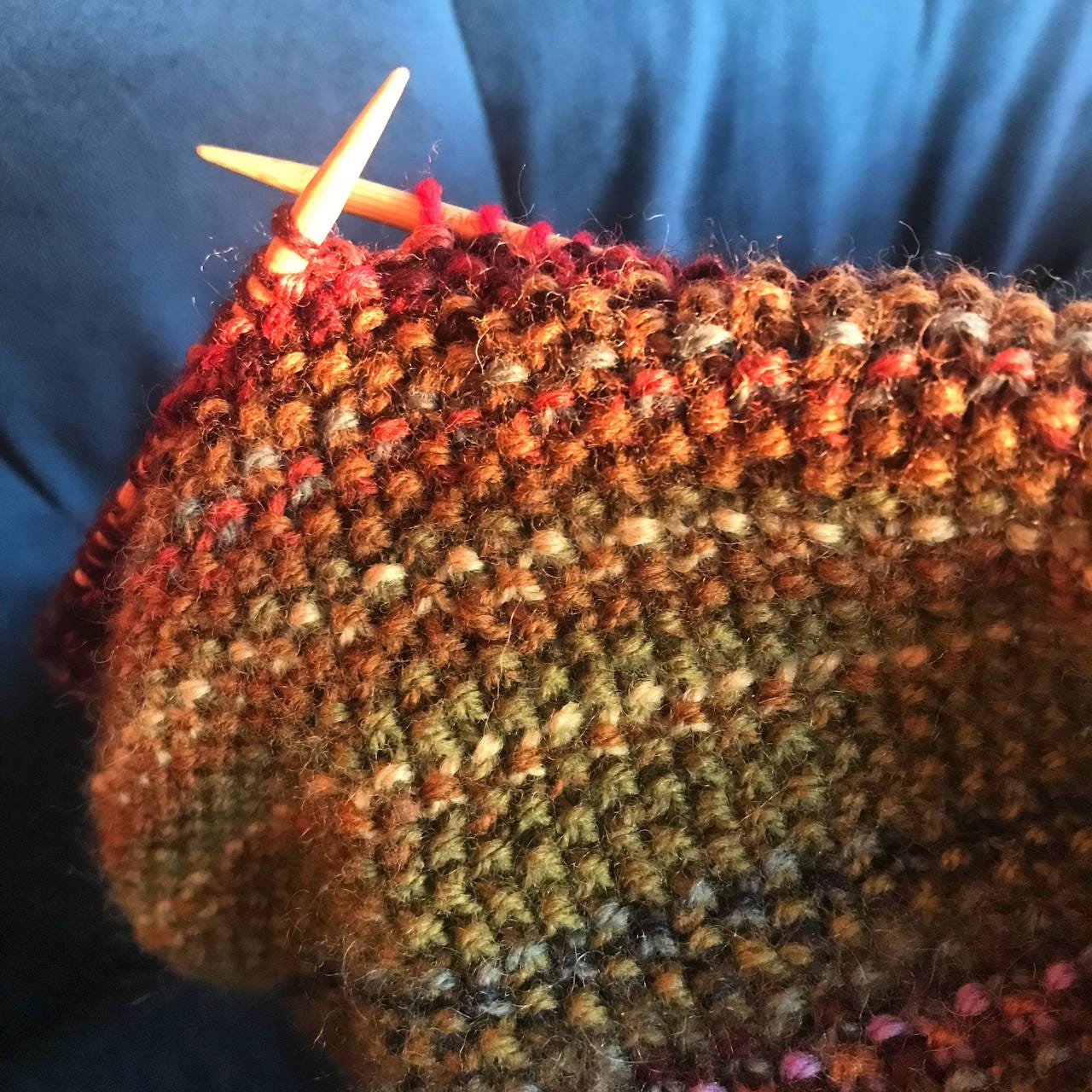
I used to know someone who was hurting and fighting and angry most of the time. Now I realize she literally just didn’t know what she was missing. She had not tasted and seen, so she ran and hid. What she knew made her feel exposed, and fear manifested as anger, so she rejected everything associated with God. I knew you to be a hard man…but she missed experiencing Him as the one who laughs and heals and walks in the garden, the one who made mercy triumph over judgment.
We only fight against goodness because we don’t realize how good it is. When we have no concept of real peace or freedom or joy, we think rebellion is better.
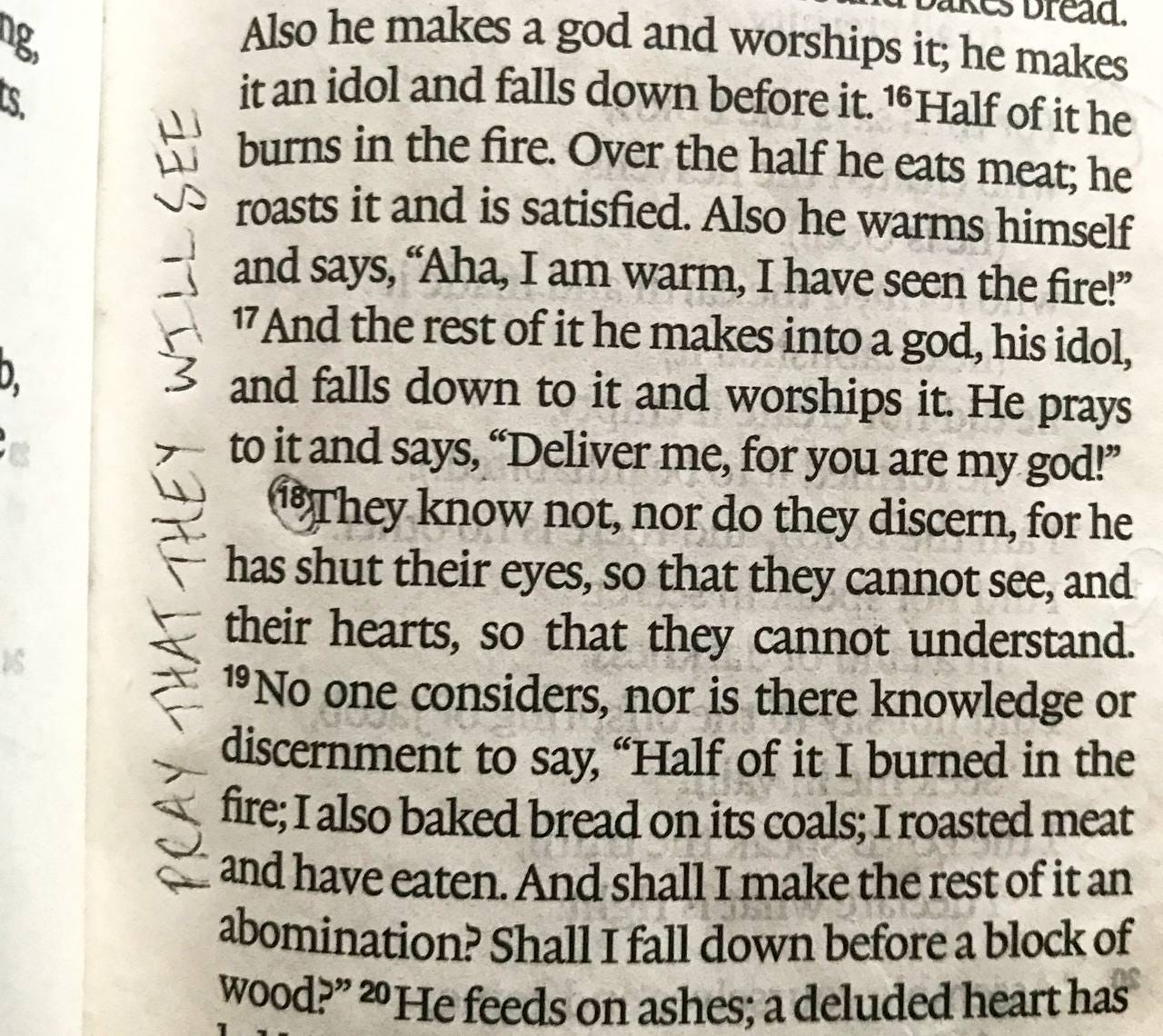
It’s changing the way I pray, because she – and everyone – needs to know His goodness. Because if they really knew His goodness, they’d recognize His love for them, and His worthiness of their love.
And their own desire would drive them to Him.
We all need to taste and see. We handle things (and relationships) differently when we know what (and whom) we’re dealing with.
We’re good at following our desires. Where we get it wrong is when our desires are out of alignment, fearful because we know so little, because ignorance breeds fear.
But once we know, there’s freedom and joy and peace, and we bear much fruit, reaping a harvest.
We know what we’re getting into, and we can’t get enough of it.
Want more posts like this? Subscribe here.
‘What ho!’ I said.
‘What ho!’ said Motty.
‘What ho! What ho!’
‘What ho! What ho! What ho!’
After that it seemed rather difficult to go on with the conversation.– P.G. Wodehouse, My Man Jeeves

